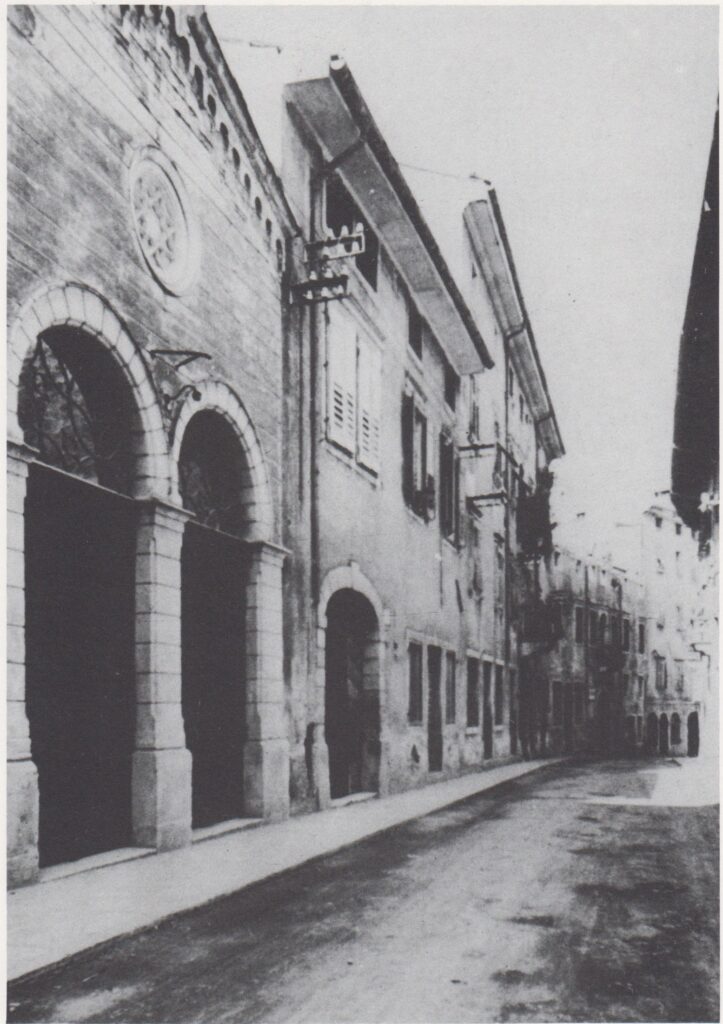Learn More

The linguist and glottologist Graziadio Isaia Ascoli (Elchanan Jesaia) was born in Gorizia in 1829. His father was Leone Flaminio, a member of the local middle class. When his father died, Ascoli abandoned his studies in order to take care of the family businesses. As a result, he was largely self-taught, with support from Rabbi Samuele Vita Lolli and Rabbi Isacco Samuele Reggio. These teachers, and the multilingual environment in which he grew up, influenced his studies, which centre around linguistics, and in particular the semitic languages and their associated dialects. At seventeen years old he published his essay Sull’idioma friulano e sulla sua affinità colla lingua valaca (On the Friulian language and its affinities with the Wallachian language).
His first political work, Gorizia italiana, tollerante, concorde. Verità e speranze nell’Austria del 1848 (Italian Gorizia: tolerant and harmonious. Truths and hopes in the Austria of 1848), demonstrates his ideals of liberty and religious equality, which he saw realised at that time by Savoy and later in the Kingdom of Italy. His irredentist sentiments grew over the course of the final years of the nineteenth century, although he never supported the war against Austria. For him it was essential to show respect and freedom for the different linguistic and cultural varieties of Venezia Giulia. It was he who coined this term to describe the area of the Austrian Adriatic coast (including the Counties of Gorizia and Gradisca, Trieste, and the Marquisate of Istria).
In the 1850s he was one of the leaders of the Gorizian Jewish Community. He married Fanny Beatrice Cohen, a Triestine coreligionist, and they had four children together. He remained closely linked to the Jewish Community where he had grown up, which honoured him by naming a street in the ancient ghetto after him during his lifetime.
In 1852 he visited Milan for the first time, where he met important linguists and orientalists, who showed a deep appreciation for his self-taught knowledge. In 1861 he accepted the newly-created post of “Scientific-Comparative Linguist” (or “Comparative Philology”) and Sanscrit language at the Accademia Scientifico-Letteraria in Milan. He coined the term “Glottology” to refer to his subject, a designation which was adopted in 1935 by the Ministry of Public Instruction.
He integrated perfectly into the Jewish Community of Milan, which had grown swiftly since its creation in 1866 (Jews had been exiled from Milan in 1597). He was also active in the Jewish papers of the time, including the Corriere Israelitico of Trieste and Casale Monferrato’s Vessillo Israelitico.
He wrote on many topics, including the Jewish emancipation, the fear of abandoning one’s original religion, Christian anti-Judaism and the blood libels, and antisemitism. The latter, in particular, was incomprehensible to him, especially the fact that it was palpable in the Nations that had conceded religious freedom to the Jews.
In 1889 he became Senator of the Kingdom of Italy. His deep admiration for Italy led him to hold anti-Zionist feelings, especially in the later years of his life.
He died in 1907 in Milan and is buried there. In 1919 the Friulian Philology Society was created in Gorizia, named after Graziadio Isaia Ascoli.
SOURCES:
Maria Elisabetta Loricchio, Graziadio Isaia Ascoli. Biografia di un intellettuale, Edizioni della Laguna, Mariano del Friuli 1999
Carla Marcato and Federico Vicario (eds), Il pensiero di Graziadio Isaia Ascoli a cent’anni dalla scomparsa, Convegno internazionale Gorizia-Udine, 3-5 May 2007, Società filologica friulana, Udine 2010
Fulvio Salimbeni, Graziadio Isaia Ascoli, un protagonista della civiltà del Risorgimento, in Miriam Davide and Pietro Ioly Zorattini (eds), Gli ebrei nella storia del Friuli Venezia Giulia. Una vicenda di lunga durata, Giuntina, Florence 2016, pp. 285-291
Translation from Italian to English by Bethany Gaunt
Project by
Jewish Community of Trieste and Ca’ Foscari University Venezia
Info
visit@triestebraica.it
